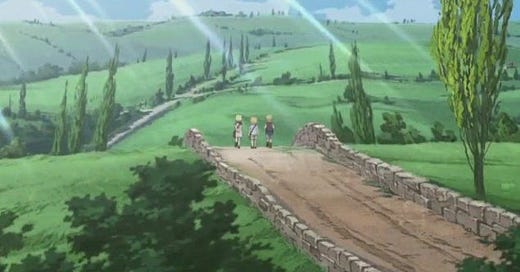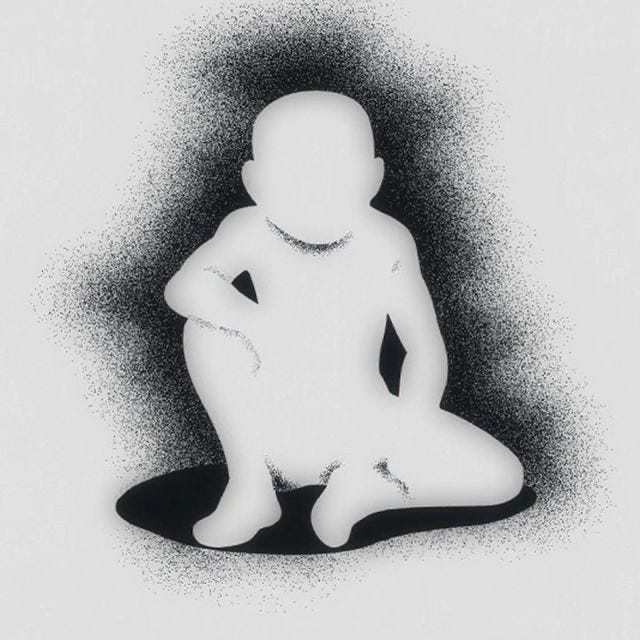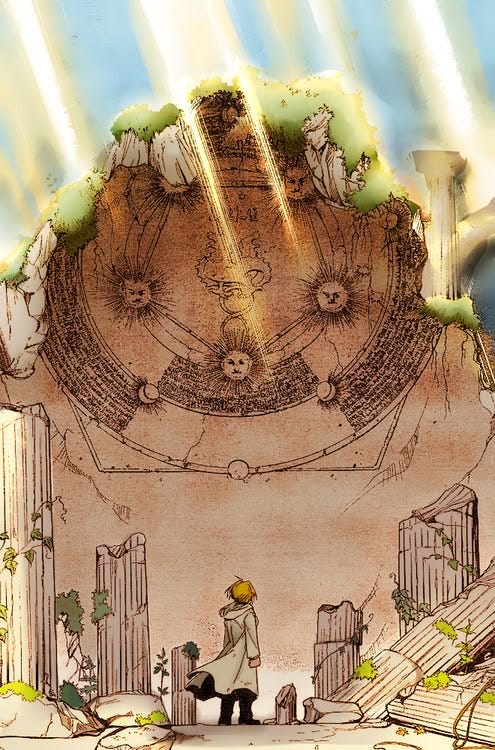what is the value of a human soul?
this is a very deep dive analysis on the anime Fullmetal Alchemist: Brotherhood, on its philosophy, and parallels with real world alchemy. probably will have a part two.
Fullmetal Alchemist is a Japanese manga series written and illustrated by Hiromu Arakawa. It was published and serialised in the magazine Monthly Shounen Gangan between the years of 2001 and 2010. It takes inspiration from the post-industrial revolution Europe, with some steam-punk aesthetics and character design.
What makes me want to talk about this series is a lot more than what it actually takes credit for. The music, the characters, the amount of studying put into the world building and the power dynamic are all the very important aspects of what makes it a show that makes you watch in awe. But two questions it asks makes it the main reason you cry in a happy ending.
What is it to be a human?
And
What is the value of a human soul?
The Elric family lives in the Eastern section of the country, in a little town named Resembool known for agriculture and husbandry, mostly known for its wool. It is a beautiful landscape with long green fields and clear air.
Edward and Alphonse start studying alchemy in an early age. The old books that Edward and Alphonse study from are their dad’s books who has left them when they were very little, and they continue to study on their own, making little statues and generally enjoying the knowledge.
Everything changes when their mother dies, they feel lost and alone. Even worse when they see that their father does not attend the funeral. And in their despair as very little and left alone children they decide to bring their mom back. We learn about Edward and Alphonse and how they have decided to go on a journey to bring their bodies back and in the little snippets of flashbacks, how they lost their bodies, too. Which brings us to the core of this essay:
Human transmutation.
Alchemists are people who understand the matter and and have the ability to decompose and reconstruct matter in their limits of knowledge, as mentioned more than once in the anime, if you do not know the components of a matter you can not practise alchemy with it. Because alchemy works on equivalent exchange, you must give something of equal value to receive something of equal value.
What is the component of a human soul?
What is the value of a human soul?
When Edward and Alphonse try to bring their mother back from death, they find themselves in front of a white shadow.
And it utters them these following words:
"Who am I? One name you might have for me is The World, or you might call me The Universe, or perhaps God, or perhaps the Truth. I am all and I am one, so of course this also means that I am you."
This is also reflected in the riddle of Izumi Curtis, brothers’ alchemy teacher, when she leaves the brothers to the island. She asks them the meaning of “All is one. One is all.” This concept is the concept of microcosm and macrocosm, which in this perspective depicted as one and all. This concept suggests two similarities, one between the human body and the universe, the other between human soul and god.
Hiromu Arakawa defines Truth as a hollow version of oneself, a version of internal god or conscience. Truth is all and one. By that logic it is also you and everyone else.
The renaissance alchemist Paracelsus suggests, with the theory of microcosm-macrocosm, there exists a light of nature inside every aspect of nature. This inner light is almost something a person can consult to, like their minds. The connection with inner light predicts the intuitive comprehension of the natural facts and spiritual illumination. As Paracelsus says, one that does not understand their place in this natural order will be lost in the vastness of the universe.
Izumi Curtis leaves the brothers in the island for this. She also says,
“If they don’t get to understand this, it is better that they don’t know alchemy.”
Alchemy, in both Arakawa’s world and Paracelsus’s writings, isn’t just a way to manipulate the world. It’s a way to understand one’s place in it. The error the Elric brothers make is not that they tried to bring back their mother. It’s that they did it believing knowledge alone was enough. The Truth punishes arrogance not out of malice, but because it holds up a mirror. Truth rewards the understanding of being a human and the place it gives you in this universe and being okay with that.
If you have been watching closely, you will realise that the gate behind each character when they stand in front of the Truth is different than one another. The gate symbolises the knowledge and inner revelation a character has gone through, their understanding of themselves, therefore the rules and values of the universe.
The Truth opens the gates of truth for the arrogant fools that try to rig the order of the universe, the arrogant fools who knew their place, but still had to try and see with their own eyes. So it shows them. Everything they can or can’t comprehend. So much to the point where their bodies get stained with it, turning into a transmutation circle itself.
The most intriguing similarity between Paracelsus’s and Arakawa’s writing is the idea of the philosopher’s stone. Because as we read through the writings we go through this realisation, which Edward also goes through in the fake gates of truth, in Gluttony’s stomach while looking at the old ruins of the Xerxes. Because of the old belief in the microcosm-macrocosm theory everything associated with human can be associated with nature itself. Which in return shows us The Truth (inner light) is the same thing as the philosopher’s stone (quinta essentia) in the microcosm-macrocosm spectrum.
Let me explain.
Most alchemists believe that the universe reflects a person. As Edward also points out, the moon represents the mind, the sun represents the soul and the relic itself in the pit of Gluttony’s stomach represents the body itself. He also points out that the red sun also depicts the philosopher’s stone. How is that?
Paracelsus used many names for the inner light. The iliaster, the astrum, the philosopher’s son. He also added that the medicine to all could be found in the astrum. The medicine he refers to is the philosopher’s stone. Both the philosopher’s son and the philosopher’s stone represent the microcosm and macrocosm of the perfect material that is beyond the four elements, the quinta essentia, the fifth essence. By this logic we can conclude that the philosopher’s stone is the macrocosm of the human soul, therefore is depicted as the red sun.
You must also realise that… then also, philosopher’s stone and The Truth are also synonymously used.
Yes.
What was the philosopher’s stone made of?
Human souls.
We know that if you want to do Alchemy without the rules, like Edward and Alphonse tried to do, you would need a philosopher’s stone, something pure and made with many… but many human souls.
Which brings us to the question: If Edward and Alphonse had a philosopher’s stone while bringing their mother back would they be able to?
The answer would be no, and Arakawa shows this through horrendous measures.
Firstly, the philosopher’s stone is only a physical depiction of a perfect material, although it is made of human souls and has countless energy inside, it can not imitate a naturally taken soul. Therefore, the price does not match the outcome. Truth may bargain with the things it has took as a price, but it doesn’t bargain with what natural order has done.
But philosopher’s stone manages to help you do alchemy without the boundaries of equivalent exchange? With materials that are not even there?
Bingo.
Arakawa tells us that there is nothing in this world, absolutely nothing that can imitate an authentic human souls. No price you might pay would let you get what a human soul is.
Secondly, we see human like creatures that have been brung to life by the philosopher’s stone. The homunculi.
The homonculus, Latin for “little man”, appears in the writings of Paracelsus. He believed, just as in our fictional universe an alchemist can create a little human, that would be able to develop and grow. This was a symbolic idea, an alchemist’s power to bridge between spirit and matter, to imitate a divine creator.
The Father or, when he was harmless the homunculus in the flask, him and Elric brothers are not so different. They both refused the limitations the world has to offer.
The dwarf in the flask made other homunculi, took them out of itself and named them Greed, Pride, Gluttony, Lust, Envy, Wrath, and Sloth. He thought that if he took his imperfections out, he would get close to being the perfect being, a god, The Truth itself. It tired and sacrificed tons and thousands of human souls just to be able to become unboundable.
When the dwarf asks the Truth in front of the Gates of Truth why it refused to be with him, the Truth says:
“You were incapable of believing in yourself. You stole your power from others. You rejected your human origins and chose to covet the power of what you call God. You never grew beyond your days in the flask.”
And indeed, if we were to look at the Dwarf’s Gate of Truth it is empty. It has never stopped and thought introspectively and never tried to connect with its inner light.
This final confrontation between the Dwarf and the Truth serves as Arakawa’s ultimate statement: the philosopher’s stone, the power to defy the rules of equivalent exchange, the hunger for omnipotence; none of it holds value without self-knowledge, humility, and reverence for life.
And this is when our second question is answered,
What is it to be a human?
The philosopher’s stone, although made from countless souls, does not contain a single authentic one. Not in the way Truth defines it, not in the way Paracelsus might have referred to the astrum. This is because a soul is not merely an energy source. It is consciousness, identity, memory, love, regret, and above all connection. That is what the stone lacks.
That is what the homunculi lack. And that is what Father ultimately lacks.
By simply being human, natural and authentic Edward suffers through life, one lesson after the other as he learns more about himself and more about the universe. His final sacrifice for his brother is not of power but of connection and care.
The most humane and most valuable thing in Truth’s eyes.
By giving up his Gates of Truth and hence his ability to do alchemy Edward rebirths the philosopher’s son inside of him. His soul becomes one with the Truth, he does not need the gates of truth anymore.
“And you are sure about this? You do realise that you will never be able to perform Alchemy again without your gate.”
“I am aware of that. This portal, I know it contains every secret the alchemy has to offer, however it has also let me astray. I saw the truth that lies within it and I became convinced that I can solve everything with alchemy. But I couldn’t possible have been more wrong. That was just arrogance.”
“You are willing to cast it aside, to lower yourself to a simple human?”
“What do you mean lower myself? That is the only thing I have ever been, just a simple human who couldn’t save a little girl, not even with alchemy.”
“You are sure you will be alright without it? Think carefully now.”
“Who even needs alchemy, when I’ve got them?”
“You have done it! That is the right answer! Good job, You have beaten me! Go ahead, take all you want! The back door is right over there, good bye Edward Elric!”
And so, Edward becomes what alchemists only dreamt of becoming. Not a god, not a conqueror of nature, but a human who has aligned soul, mind, and body with the cosmos. He is no longer the boy who tried to reverse death. He is the man who understands that death, love, loss, and life are inseparable parts of the same alchemical chain.
He no longer needs the philosopher’s stone, because he has become it. And even maybe purer than it. And that is what being a human is.
Glossary
Alchemy: The science of breaking down and reconstructing matter through Equivalent Exchange. In essence, it’s a way of understanding both the world and the self.
Gates of Truth: The doorway to ultimate knowledge and self-awareness. Each gate is unique, showing the soul’s reflection and the universe’s structure.
Human Transmutation: The forbidden act of trying to resurrect the dead. A moral and cosmic violation that always comes at a devastating cost.
Transmutation Circle: A symbol used to perform alchemy. It channels intent and knowledge — and can mark the body itself when one faces the Truth.
Special thanks to,
Max Derrat YouTube channel which helped me understand the alchemical texts more thoroughly. Specifically the linked video which explained exactly what I wanted to in many areas.







